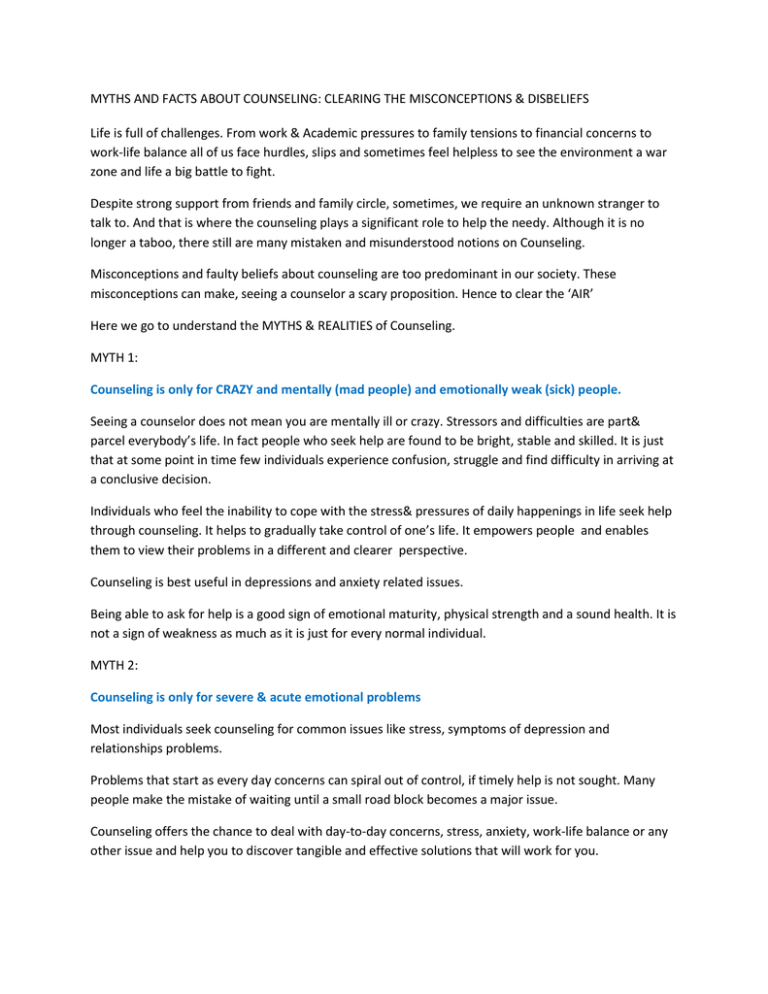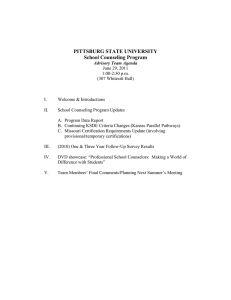MYTHS AND FACTS ABOUT COUNSELING: CLEARING THE MISCONCEPTIONS & DISBELIEFS
advertisement

MYTHS AND FACTS ABOUT COUNSELING: CLEARING THE MISCONCEPTIONS & DISBELIEFS Life is full of challenges. From work & Academic pressures to family tensions to financial concerns to work-life balance all of us face hurdles, slips and sometimes feel helpless to see the environment a war zone and life a big battle to fight. Despite strong support from friends and family circle, sometimes, we require an unknown stranger to talk to. And that is where the counseling plays a significant role to help the needy. Although it is no longer a taboo, there still are many mistaken and misunderstood notions on Counseling. Misconceptions and faulty beliefs about counseling are too predominant in our society. These misconceptions can make, seeing a counselor a scary proposition. Hence to clear the ‘AIR’ Here we go to understand the MYTHS & REALITIES of Counseling. MYTH 1: Counseling is only for CRAZY and mentally (mad people) and emotionally weak (sick) people. Seeing a counselor does not mean you are mentally ill or crazy. Stressors and difficulties are part& parcel everybody’s life. In fact people who seek help are found to be bright, stable and skilled. It is just that at some point in time few individuals experience confusion, struggle and find difficulty in arriving at a conclusive decision. Individuals who feel the inability to cope with the stress& pressures of daily happenings in life seek help through counseling. It helps to gradually take control of one’s life. It empowers people and enables them to view their problems in a different and clearer perspective. Counseling is best useful in depressions and anxiety related issues. Being able to ask for help is a good sign of emotional maturity, physical strength and a sound health. It is not a sign of weakness as much as it is just for every normal individual. MYTH 2: Counseling is only for severe & acute emotional problems Most individuals seek counseling for common issues like stress, symptoms of depression and relationships problems. Problems that start as every day concerns can spiral out of control, if timely help is not sought. Many people make the mistake of waiting until a small road block becomes a major issue. Counseling offers the chance to deal with day-to-day concerns, stress, anxiety, work-life balance or any other issue and help you to discover tangible and effective solutions that will work for you. Counseling does help people with severe problems. Seeking help when problems are mild to moderate can prevent problems from becoming severe. MYTH 3: Counselor is a stranger and therefore counseling will not help much. This is where counseling is found to be very effective and successful. Not knowing you personally enables the counselor to be neutral, objective and non-judgmental. Most people find it easier to open up to a complete stranger than to share their most intimate concerns, worries & problems with loved ones. Family and friends form two way relationships, whereas Talking to an unknown, professionally qualified person as a counselor, is all about “YOU” and can help you to open up, remove the fear, anxiety, apprehensions and help to find the right answer for your life. A friend or a family member would often have their own opinions or suggestions of what might be right for you. However, if you wish to focus on arriving at your own answer or solution, speaking to a counselor will help you to get an unbiased and deeper understanding of yourself and your situation. Moreover no counselor will have vested interest in any one’s plans or life and can therefore actively listen to the issues that are voiced. They will listen, help you to develop clear thinking and help you to identify possible solutions with the assurance of total confidence. MYTH 4: Everyone will come to know that I am seeing a Counselor SO WHAT? It is your LIFE and you alone can take charge of your life and own responsibility to whatever happens. Counseling is a confidential experience of the client and happens totally between the client and the counselor. While you know you are attending sessions, no one will know what are being discussed. Counselors are bound by professional ethics and so have the commitment to your privacy and confidentiality both during and after the counseling session ends. Only in extreme situations where the need is felt for supportive help, it will be shared with people in closed circle of the client. Myth 5: How much can I trust the counselor in what I speak out is not shared with my friends, supervisors or relatives? Another Ethics of counseling is TRUST and total confidentiality. Counselors are ethically bound to maintain confidence except in situations where there is a risk of self harm, harm to others etc. MYTH 6: Counselors can give solutions to all problems and can cure giving medicines. Counselors are not medical professionals. They cannot prescribe medicines. At the most if they realize the need they will refer to a Psychiatrist or a mental health Professional. There is no “One size fits all” kind of ready made solution available with the counselors. They are not also advice giving machines. They work along with you in understanding the issues and help you get insight and clarity to the issues and problems faced by you. This will help you to make own decisions which will prove to be healthy and productive. MYTH 7: Counselors can read the mind. They will draw out the deep dark secrets. Definitely NOT. They can only help you to understand your issues and problems. They will help you to understand yourself better. They will limit to only the issues or problems that you prefer to share or seek help for. Decision to share what, how much & when are all decisions of the clients. As and when he/she feels comfortable, concerns can be shared. MYTH 8: Counselors will change from what I AM. I will be judged based on my sharing. Ethics of counseling is not to judge a person who seeks help. Therefore a counselor will accept you unconditionally. The focus will be only on the issues that you share from your point of view and never on your persona. Change is inevitable and a client will therefore experience a change in their thinking from session to session. These are all progressive changes that will help the client to free themselves from all negativity. Any change can happen only if you decide to change either during or by the end of the session based on what is useful for you in meeting your goals or to see a progressive way forward from the stumbling blocks for which you preferred to seek the help and guidance. Decision to change is purely your choice and is in your hands. MYTH 9: Counseling is expensive Yes, it is because of the nature of service and number of sessions. But IT IS PROVIDENTIALLY FREE FOR THE INSTITUTE COMMUNITY; ESPECIALLY THE STUDENTS. MYTH 10: Going to a counselor means I am out of control No. Actually it is a way of taking control of your emotional imbalance and understand the reality in the distress situation. With the clarity arrived at, you will be able to see a different perspective to the issue and can arrive at a decisive solution. Talking to a counselor is a great way to take control of your thoughts, feelings and behavior and then to make changes to improve your quality of life, as mood and behavior not only affect you but also people around you. MYTH 11: Counselors can “fix” my problems. Counseling has a no quick solution to any problem. The role of counselors is to explore your thoughts, feelings, concerns and help you with options and assist you in achieving the goals you have set MYTH 12: Counseling is only for MEN/ WOMEN. Counseling is not gender specific. But it is a fact that number of male seeking help is more than the female gender. One of the reasons could be that the female gender has a better emotional control comparatively. But BOTTLING UP in the PRETENTION of control is detrimental to both. ( will be contd)


